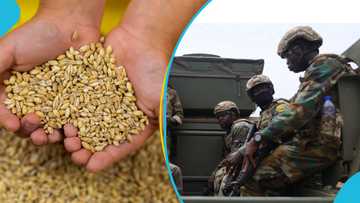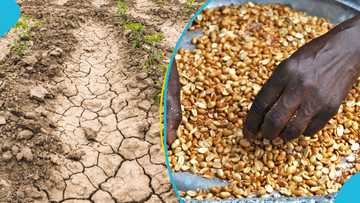Peasant Farmers Push Against Government's Ban On Grain Exports
- The President of the Peasant Farmers Association said the government had failed to consult them on its grain export ban
- The Minister of Food and Agriculture, Bryan Acheampong, who announced the ban, stated that it was to ensure the country's food security
- But Bismark Nortey said the ban may inadvertently hurt peasant farmers who depend on exporting their grains to meet production costs
Don't miss out! Get your daily dose of sports news straight to your phone. Join YEN's Sports News channel on WhatsApp now!
The Peasant Farmers Association has expressed displeasure with the government’s move to ban the export of key grains, including maize, rice and soybeans.
The Minister for Food and Agriculture, Bryan Acheampong, said the ban will ensure that the country remains food secure for the foreseeable future despite the ongoing drought in Ghana’s northern sector.

Source: Getty Images
The dry spell has wreaked havoc on agricultural production in eight regions of Ghana, leaving plants wilted and farmers devastated by the huge losses.
However, reacting to the Agricultural Minister’s directive, Bismark Owusu Nortey, the president of the Peasant Farmers Association, said the measure was done without consulting the peasant farmers most affected by the drought.
He said the peasant farmers are major stakeholders in the sector, and it would have been prudent if they were involved in finding a lasting solution to Ghana’s food insecurity crisis.
He said the ban on grain exports may have unintended consequences on peasant farmers.
Bismark Nortey explained that the ban on grain exports would force farmers to sell their produce cheaper than their production costs due to the narrowing of their market.
He said with farmers unable to sell their markets in other West African markets, demand for their produce would drop, putting their grains at risk of spoiling in their barns.
He said the government should have consulted local farmers before implementing measures to protect them from this undesired effect.
Government announces relief packages for farmers
Meanwhile, Dr Mohammed Amin Adam, the Finance Minister, has disclosed that the government has allocated GH¢8 billion to provide relief and mitigative measures to farmers affected by the ongoing drought in the northern half of Ghana.
He noted that while the support may not entirely neutralise the drought's impact, it would help stabilise the situation.
He stated that the government is currently working on raising approximately $500 million to fund the crisis response programme.
Dr Amin Adam disclosed that the package would include cash transfers and the distribution of food and other essential items to affected farmers.
A technical team comprising the Ministries of Finance and Food and Agriculture will supervise the distribution of the packages to ensure transparency and fairness.
FABAG urges government to scrap duties on essential commodities
YEN.com.gh reported that the Food and Beverages Association of Ghana (FABAG) has advocated removing duties on essential commodities.
Taking inspiration from developments in Nigeria, FABAG said removing duties on rice, oil and maize could reduce food inflation and address food insecurity in the country.
The Association argued that the ongoing drought in the northern sector of Ghana should push the government to act now.
Proofread by Berlinda Entsie, journalist and copy editor at YEN.com.gh
New feature: Сheck out news that is picked for YOU ➡️ click on “Recommended for you” and enjoy!
Source: YEN.com.gh




